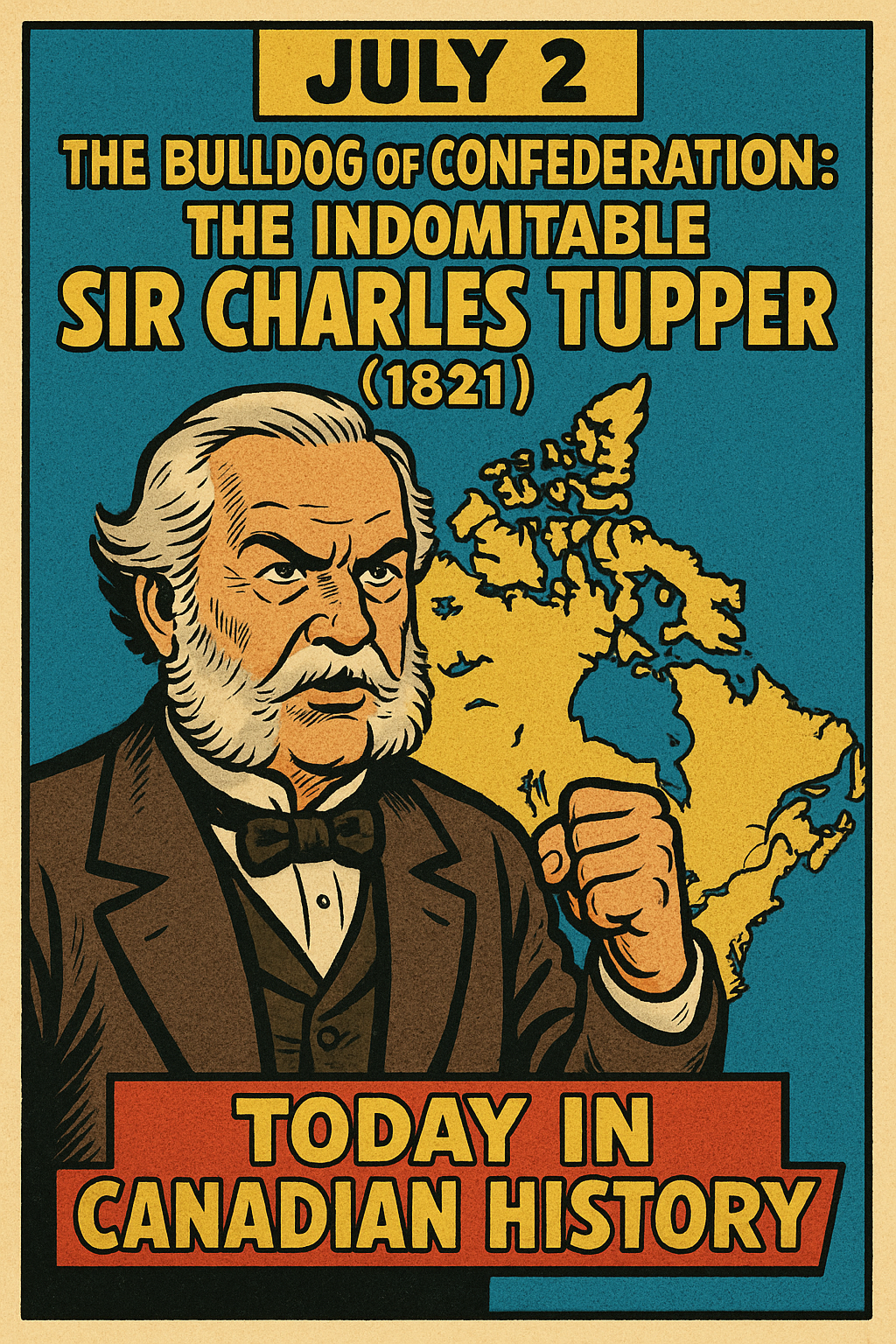
Birth of the Bulldog of Confederation
Share
Welcome back to "Today In Canadian History." While yesterday we celebrated the grand, collective achievement of Confederation, today we turn our attention to one of its most forceful and indispensable architects. On this day, July 2nd, in 1821, a man of immense ambition and unyielding determination was born in Amherst, Nova Scotia. His name was Charles Tupper, and his political tenacity would earn him the moniker "The Bulldog of Confederation." To simply call him a Father of Confederation, or even Canada's shortest-serving Prime Minister, is to tell only a fraction of a story that is deeply intertwined with the very creation of our country.
Born into a family of Baptist farmers, Tupper’s early life was one of intellectual curiosity and drive. He pursued medicine, studying at the prestigious University of Edinburgh in Scotland, and returned to Amherst to establish a successful medical practice and a drug business. But the world of politics, with its grand debates and the chance to shape the destiny of his home colony, soon beckoned.
Tupper entered the Nova Scotia Assembly in 1855, quickly establishing himself as a formidable presence. His sharp intellect, combined with a pugnacious and often abrasive debating style, made him a powerful opponent. By 1864, he had risen to the office of Premier of Nova Scotia. It was from this position that he would champion his most audacious and controversial cause: the union of the British North American colonies.
The idea of Confederation was far from popular in Nova Scotia. Many Nova Scotians, fiercely proud of their distinct identity, their strong maritime economy, and their long history of responsible government, saw little benefit in tying their fortunes to the larger, inland Province of Canada. The powerful merchant class and a majority of the public, led by the charismatic anti-Confederationist Joseph Howe, viewed the proposal with deep suspicion, fearing it would lead to higher taxes, conscription for a Canadian army, and the diminishment of their political influence.
This is where Tupper's "Bulldog" nature came to the fore. Facing overwhelming opposition at home, he remained unshakeable in his conviction that a larger union was essential for economic prosperity, collective security against a potentially expansionist United States, and the creation of a great new nation under the British Crown. He was a central figure at both the Charlottetown and Quebec Conferences in 1864, where he skillfully debated and negotiated the terms of the union.
His greatest challenge, however, was not in the conference rooms but in his own backyard. Realizing he could not win a public vote on the matter, Tupper used his political power as Premier to push the Confederation scheme through the Nova Scotia legislature without seeking a direct mandate from the people. It was a bold, even audacious, political gamble. When it came time to finalize the agreement, Tupper led the delegation to the London Conference in 1866, where the final details of the British North America Act were hammered out. His powerful advocacy and intimate knowledge of the political landscape were crucial in persuading the British government of the viability of the project.
When the Dominion of Canada was born on July 1, 1867, Charles Tupper had secured his place in history. He had delivered his province into the new federation against the will of many of its inhabitants, a feat that cemented his reputation as a master political strategist. He transitioned to federal politics, serving in the cabinet of Sir John A. Macdonald in various influential roles, including Minister of Public Works and Minister of Railways and Canals, where he played a key part in the early development of the Canadian Pacific Railway. He later served a long and distinguished tenure as Canada's High Commissioner to the United Kingdom.
In 1896, at the age of 74, he was called upon to serve as Prime Minister of Canada, a role he held for a mere 69 days, the shortest term in Canadian history. He took the helm of a Conservative party in disarray and led them into an election he would lose. While his time at the very top was fleeting, it was the capstone to a remarkable political career.
So today, as we mark his birth, let's remember Sir Charles Tupper not just as a name on a list of Prime Ministers, but as the relentless, unyielding force who, through sheer political will, dragged a reluctant Nova Scotia into the grand Canadian experiment. He was a controversial figure, certainly, but without his bulldog determination, the map of Canada as we know it today might look very different.
